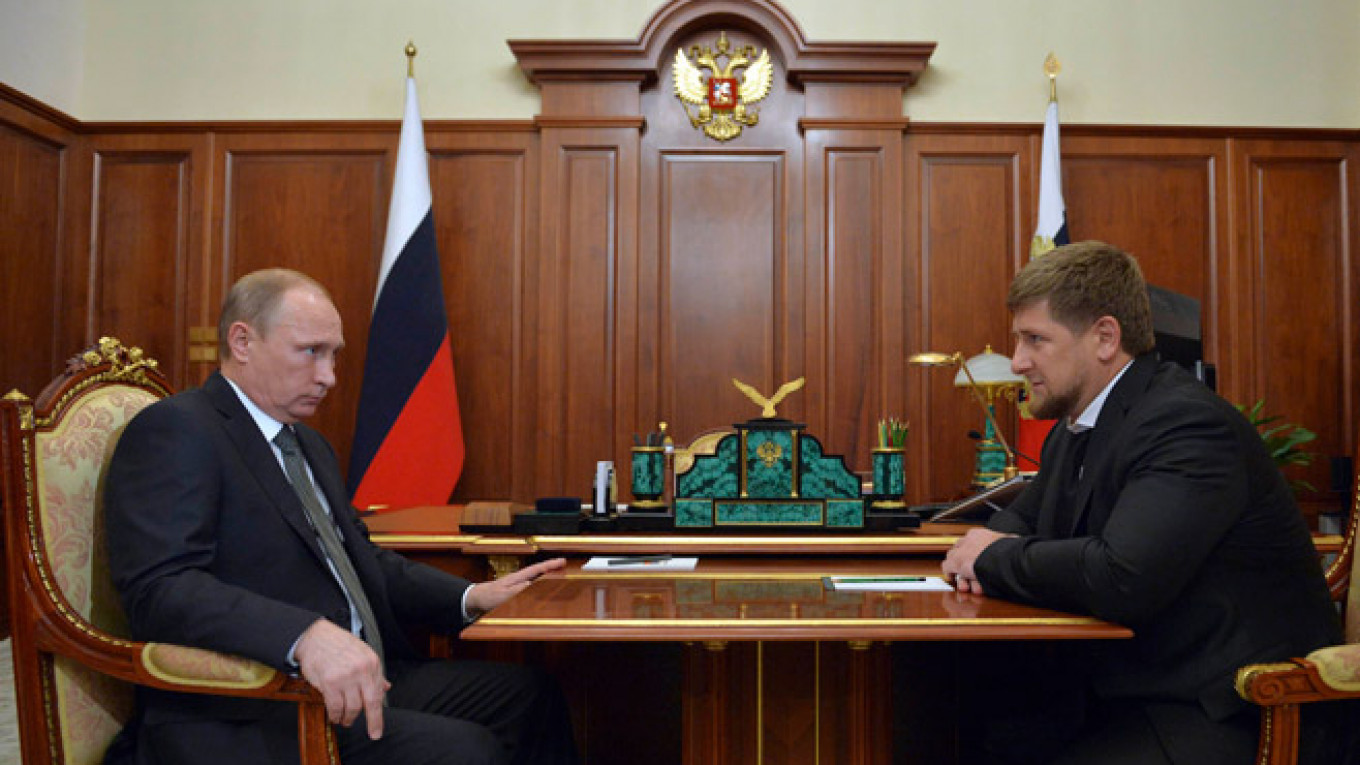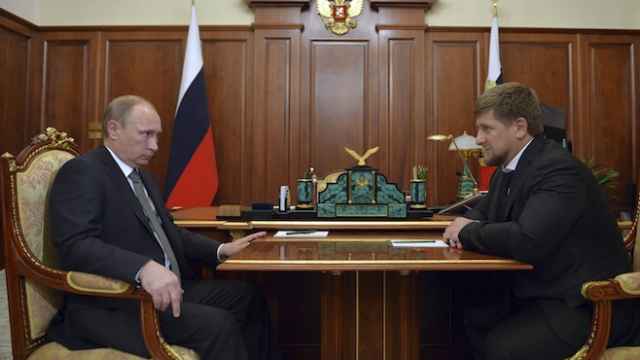Chechnya's strongman leader Ramzan Kadyrov appears to be having a very public meltdown following the deadly terrorist attack on Grozny on Dec. 4.
In the wake of the attack, which claimed the lives of at least 10 policemen and injured dozens more, Kadyrov has given vigilantes the green light to burn down the homes of militants' relatives and has accused a top human rights group of being in cahoots with terrorists — a claim followed almost immediately by an arson attack on that group's headquarters.
"Today, the only organization supporting terrorism is Kalyapin's organization," Kadyrov wrote last week on Instagram, referring to the head of the nongovernmental Committee Against Torture, Igor Kalyapin, who had called Kadyrov out for his earlier irresponsible Instagram statements making militants' relatives responsible for terrorism.
In apparent retaliation for Kalyapin's public scolding, Kadyrov wrote that he had "information" that someone named Kalyapin had ties to the reportedly deceased Chechen rebel leader Doku Umarov, and had financed militants.
It took only a day after those comments for a group of masked men to torch the offices of Kalyapin's group in Grozny.
Kadyrov is playing a dangerous game, the one and only rule of which seems to be throwing the word "terrorist" around in the most reckless of ways. Have a score to settle with someone? Call him a terrorist and masked men will take care of the rest, as we have seen more than once in recent days.
The trick has been used just as effectively throughout the Ukraine conflict, with both Russian officials and Ukrainian officials referring to the opposing side as "terrorists" to justify violence against them.
But in Chechnya, where memories of gruesome terrorist attacks are still fresh and the wounds haven't even begun to heal, it's a much more dangerous game — and Kadyrov is playing fast and loose despite presumably being aware of that fact.
It was one thing to proclaim that the relatives of militants should be held responsible if they are aware of plans for terrorist attacks but do nothing to stop them; it's another thing entirely to put targets on the backs of human rights activists.
Kadyrov's proclamations beg the question of where the demarcation line is: How low might he stoop to settle scores and prove his own status as top dog in Chechnya's war on terror?
If he is both the judge and jury in this war on terrorism, a war that apparently requires no trial and sees relatives of militants driven out even if there is no proof that they were aware of their loved one's activities, what's next?
Will the schoolteachers who once taught the militants be held responsible for failing to catch an early inclination toward terrorism? Will unknown men in masks show up at their homes in the dead of night and torch them?
What about the taxi drivers whose cabs militants might catch a ride in, or any other member of the public they come into contact with — will they be seen as guilty somehow too?
The human rights activists who have all but had bounties placed on their heads by Chechnya's official leader were the ones trying to preserve rationality and order in a chaotic situation.
In the wake of the Dec. 4 attack, when the public is understandably angry and wants someone to blame, it was the human rights activists who were trying to keep that rage from spinning out of control and claiming innocent victims, something that history shows is all too often a side effect of terrorist attacks.
But now they have been placed on the same level as terrorists. And that is risky not only for them, but for the entire republic, because it is precisely this take-no-prisoners attitude by Chechen leadership that insurgents use to sweet-talk new recruits.
Social media pages that are friendly to the underground insurgency are inundated with tales of persecution of innocent people by Kadyrov's men; it's one of the key selling points the militants have. Persecution of innocent citizens was also said to be the militants' motivation for the Dec. 4 attack.
So while Kadyrov claims to be preserving peace and stability in the new Chechnya, he's actually just given more fuel to the real enemies in the war on terror.
Saturday's rally against terrorism in Grozny, attended by thousands, should give a pretty good indication of the power that Kadyrov's words have had — and the speed with which he could mobilize a lynch mob against whomever he dubs a "terrorist."
On Sunday, with only ashes and debris left of the Committee Against Torture's headquarters and staff members forced to leave Chechnya, Kadyrov was silent on the incident.
Anyone waiting for the strongman leader to condemn not one, but two well-organized attacks on those he has declared open season on should not hold their breath.
But maybe, just maybe, the human rights activists in his sights this time around will be lucky. Maybe they will get off with simply being driven out of town.
One can only hope that the buck will stop there, that none of these activists will go missing for days only to turn up dead, like the prominent human rights activist and Kadyrov critic Natalya Estemirova did not so long ago, dumped by the side of the road like trash with bullet wounds in her head.
Contact the author at [email protected]
A Message from The Moscow Times:
Dear readers,
We are facing unprecedented challenges. Russia's Prosecutor General's Office has designated The Moscow Times as an "undesirable" organization, criminalizing our work and putting our staff at risk of prosecution. This follows our earlier unjust labeling as a "foreign agent."
These actions are direct attempts to silence independent journalism in Russia. The authorities claim our work "discredits the decisions of the Russian leadership." We see things differently: we strive to provide accurate, unbiased reporting on Russia.
We, the journalists of The Moscow Times, refuse to be silenced. But to continue our work, we need your help.
Your support, no matter how small, makes a world of difference. If you can, please support us monthly starting from just $2. It's quick to set up, and every contribution makes a significant impact.
By supporting The Moscow Times, you're defending open, independent journalism in the face of repression. Thank you for standing with us.
Remind me later.






